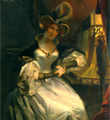| |
| |
THIS WEEK IN THE BULLETIN
There's Courbet's remarkable painting of Proudhon and his children, a special dossier on the only figure who really spans the two empires, Queen Hortense, including a detailed biography, some paintings, her most famous musical composition, an e-postcard and even en ebook. Then there's plenty to get your teeth into in our 200 and 150 years ago sections. 200 years ago, there was British looting in Danish ports, the Code Napoléon spreading throughout continental Europe, the beginning of the practice of battle commemoration, free concerts, fireworks, etc, and the secret beginning of the French invasion of Portugal, 200 years ago. 150 years ago, Napoleon III decreed the creation of the St Helena medal, finally fulfilling Napoleon I's will. We also bring you a case of photograph manipulation (?) during the Second Empire.
Enjoy!

|
|
|
|
|
|
|
| |
200 YEARS AGO
Denmark
Following the bombardment of Copenhagen by the British fleet under Lord Cathcart in the middle of August 1807 and subsequent the seizing of the Danish fleet, the Moniteur (citing the Nouvelle Gazette de Hambourg, dated 26 September) indignantly reported on British looting in the port. “The British are putting every effort into taking whatever they can find in the naval dockyards. But they are performing this frightful brigandage so carelessly that they have suffered for their own precipitation. Several days ago, a fire started in a dockyard magazine, and this led to several deaths and mutilations.”
Le Moniteur Universel, 12 October, 1807.
Musée Napoléon
A note in the Moniteur informed readers that an exhibition of statues, busts, antique bronzes, paintings, sketches and curiosities seized by the Grande Armée in Prussia in 1806 would open at the Musée Napoléon (today's Louvre) on 14 October, 1807, exactly a year to the day from the Battle of Jena.
Le Moniteur Universel, 12 October, 1807
Code Napoléon
The Publiciste (dated 7 October) reported that “all the universities in Saxony were hurrying to set up law courses on the Code Napoléon. Professor Seidensticker has started such a course in Jena. And the law professors in Westphalia have announced that they are following suite, now that the Code Napoléon is to be the law for the Kingdom of Westphalia.” The kingdom of Wetsphalia had been created at the beginning of September 1807.
Le Moniteur Universel, 16 October, 1807
Jena one year on
The Moniteur reported on the celebrations performed in Paris for the first anniversary of the battle, 13 and 14 October. These included: free theatre performances, firework displays in the Tuileries gardens, and a grand orchestral concert on the palace terrace, not to mention illuminations throughout the city.
Le Moniteur Universel, 16 October, 1807
War clouds over Portugal
As part of his plan to seal Europe hermetically from British trade, Napoleon returned to his plan for Portugal. Given that diplomatic channels had failed to bring about an alliance, she was to be invaded by troops under Junot so as to detach her from her century-long ally, Britain, her ports were to be closed to British goods, and she was to be placed under the suzerainty of the Spanish king. Indeed, the emperor had bolstered his Spanish alliance by writing to Charles IV describing him as a “faithful ally of my crown” and asked him for assistance in “tearing Portugal away from Britain's influence and forcing the latter to wish, and to sue, for peace”. (Correspondence N° 13,131). On 15 October, 1807, as French troops were already on route for Portugal, the Duke of Frias, the Spanish ambassador extraordinary to France received an audience with Napoleon at the palace of Fontainebleau (Le Moniteur Universel, 16 October, 1807), the very palace where Duroc, Talleyrand and Spanish negotiator Eugenio Martin de Izquierdo, (Godoy's agent), were secretly negotiating the fate of a (soon-to-be) conquered Portugal. In a letter to Junot, dated 17 October (Correspondence N° 13,267), Napoleon noted: “I have just learned that Portugal has declared war on Britain and expelled her ambassador. This does not satisfy me. Continue your march. I have reason to believe that this has been concerted with Britain in order to give British forces time to come from Copenhagen."
150 YEARS AGO
St Helena Medal
The Le Moniteur Universel (dated 15 October, 1857) published the following message from the French Ministry for the Navy and the Colonies. “Ex-sailors and marines, residing in the Seine department who, believing themselves to qualify for the Médaille de Sainte-Hélène but who do not possess either passing out papers or service certificates, are invited to go to the Navy Ministry, Bureau du service intérieur et des archives, on any day between Midday and 2pm, before 25 October, where their declarations can be checked.”
Napoleon III had passed a decree dated 12 August, 1857, instituting a medal for the officers and soldiers “who had fought for the glory and independence of France between 1792 and 1815”, thus fulfilling a desire expressed (but never realised) in will of Napoleon I. The medal was to be made of bronze, surmounted by an imperial crown, and hung on a ribbon coloured green with fine red stripes. It was to bear the inscription “To his companions in glory, his last thoughts. May 1821”. Unlike the Military Medal of 1852, no pension was attached to the award. Despite this fact and that the youngest to receive the award were already 60 years old, more than 50,000 in the end received the medal.
Wishing you an excellent, Napoleonic, week.
Peter Hicks
Historian and Web editor
THE NAPOLEON.ORG BULLETIN, No 429, 12 - 18 October, 2007
Interested in the work of the Fondation Napoléon? Why not participate, either generally or in a specific project, by making a donation.
© this Napoleon.org weekly bulletin is published by the Fondation Napoléon. Reproduction or all or part of this bulletin is forbidden, without prior agreement of the Fondation Napoléon.

|
|
|
|
|
|
|
|
|
|
|
|
Got a problem with a link in the Bulletin? Go to the homepage: http://www.napoleon.org
NOTA BENE: BIBLIOTHEQUE MARTIAL LAPEYRE
During the All Saints/All Souls holidays (from Monday 29 October to Wednesday 7 November) the Fondation Napoléon library will open on Tuesdays and Wednesdays from 13h30 to 18h.
Seen on the web
- Photographic abuse during the Crimean War?
THIS WEEK in the MAGAZINE
SNIPPETS
- Museum of Dietikon (Switzerland) to inaugurate Masséna monument
WHAT'S ON
Conferences:
- Italian and French architectural culture in the Napoleonic period: professional and stylistic problems, Rome, Italy
- The idea of the antique in the French decade, Naples, Italy
- Monarchy and Exile, London, UK
Exhibitions:
- Gustave Courbet's works, Grand Palais, Paris, France
- Empress Josephine's Malmaison Collection, Somerset House, London, UK
- At the court of Louis Napoleon, first King of Holland (1806-1810), Paris, France
- 1807-2007: 200 years of economic life and consular justice, Paris, France
- "The trace of the eagle", the Invalides dome, Paris, France
<<
|
|



